Crookedcomputerchaos


-
 ioella liked this · 9 months ago
ioella liked this · 9 months ago -
 assigned-spoon-at-birth liked this · 9 months ago
assigned-spoon-at-birth liked this · 9 months ago -
 valentinaoo reblogged this · 10 months ago
valentinaoo reblogged this · 10 months ago -
 cericebelle reblogged this · 10 months ago
cericebelle reblogged this · 10 months ago -
 cericebelle liked this · 10 months ago
cericebelle liked this · 10 months ago -
 crookedcomputerchaos reblogged this · 10 months ago
crookedcomputerchaos reblogged this · 10 months ago -
 namiswan-op liked this · 10 months ago
namiswan-op liked this · 10 months ago -
 d4y-4nd-night liked this · 10 months ago
d4y-4nd-night liked this · 10 months ago -
 inorog27 liked this · 10 months ago
inorog27 liked this · 10 months ago -
 gildedwildwood reblogged this · 10 months ago
gildedwildwood reblogged this · 10 months ago -
 gildedwildwood liked this · 10 months ago
gildedwildwood liked this · 10 months ago -
 wannano-thetruth liked this · 11 months ago
wannano-thetruth liked this · 11 months ago -
 0mixoe liked this · 11 months ago
0mixoe liked this · 11 months ago -
 sandylovesyousomuch liked this · 11 months ago
sandylovesyousomuch liked this · 11 months ago -
 coca-cola333 liked this · 11 months ago
coca-cola333 liked this · 11 months ago -
 anikiri liked this · 11 months ago
anikiri liked this · 11 months ago -
 eveningfountain liked this · 11 months ago
eveningfountain liked this · 11 months ago -
 bookery-bread liked this · 11 months ago
bookery-bread liked this · 11 months ago -
 flower-bugaboo liked this · 11 months ago
flower-bugaboo liked this · 11 months ago -
 niyalibata liked this · 11 months ago
niyalibata liked this · 11 months ago -
 patohabladora liked this · 11 months ago
patohabladora liked this · 11 months ago -
 hyperbunny94 reblogged this · 11 months ago
hyperbunny94 reblogged this · 11 months ago -
 eclecticfestcandy liked this · 11 months ago
eclecticfestcandy liked this · 11 months ago -
 muraskivioletta liked this · 11 months ago
muraskivioletta liked this · 11 months ago -
 gentlygolden liked this · 1 year ago
gentlygolden liked this · 1 year ago -
 reawoo liked this · 1 year ago
reawoo liked this · 1 year ago -
 burnout247 liked this · 1 year ago
burnout247 liked this · 1 year ago -
 windowdressingwindow liked this · 1 year ago
windowdressingwindow liked this · 1 year ago -
 more-silver-than-gold liked this · 1 year ago
more-silver-than-gold liked this · 1 year ago -
 more-silver-than-gold reblogged this · 1 year ago
more-silver-than-gold reblogged this · 1 year ago -
 lycentropy liked this · 1 year ago
lycentropy liked this · 1 year ago -
 butterflybutterfree reblogged this · 1 year ago
butterflybutterfree reblogged this · 1 year ago -
 butterflybutterfree liked this · 1 year ago
butterflybutterfree liked this · 1 year ago -
 distortedhumor reblogged this · 1 year ago
distortedhumor reblogged this · 1 year ago -
 s0mesugar liked this · 1 year ago
s0mesugar liked this · 1 year ago -
 cherrytearz liked this · 1 year ago
cherrytearz liked this · 1 year ago -
 stella-clara reblogged this · 1 year ago
stella-clara reblogged this · 1 year ago -
 they-call-me-veral liked this · 1 year ago
they-call-me-veral liked this · 1 year ago -
 dingdongbingbong420 liked this · 1 year ago
dingdongbingbong420 liked this · 1 year ago -
 lettucecomplexx liked this · 1 year ago
lettucecomplexx liked this · 1 year ago -
 pigeons-are-great liked this · 1 year ago
pigeons-are-great liked this · 1 year ago -
 loveablefangirl29 liked this · 1 year ago
loveablefangirl29 liked this · 1 year ago -
 imaginlittletramp liked this · 1 year ago
imaginlittletramp liked this · 1 year ago -
 j0cto liked this · 1 year ago
j0cto liked this · 1 year ago -
 bayplant07 liked this · 1 year ago
bayplant07 liked this · 1 year ago -
 smallzombieshark liked this · 1 year ago
smallzombieshark liked this · 1 year ago -
 audikatia reblogged this · 1 year ago
audikatia reblogged this · 1 year ago -
 lariempanada liked this · 1 year ago
lariempanada liked this · 1 year ago -
 2ddeleted liked this · 1 year ago
2ddeleted liked this · 1 year ago
More Posts from Crookedcomputerchaos
Sumeru's big four and the four Cardinal Virtues (3.4)

Some for fun-lore notes about a potential connection between the main characters featured during the Sumeru Archon quest and philosophy (or just an excuse to write and do some character analysis using the virtues as foundation.) Archived for future reference + whoever might be interested in reading!
Virtue ethics is very extensive and will vary slightly between different cultures. It can be traced back to Plato, Aristotle, the Stoics, and the Epicureans in the West and philosophers like Mencius and Confucius in the East. I am primarily looking at Ancient Greece, Plato and Aristotle's Nicomachean Ethics as a point of reference and framework given how much of Plato's philosophy is already present in Hoyo's games, but keep in mind that these notes are simplified observations of the main four virtues in classical philosophy and Christian theology. Sources are either directly linked or listed at the end! The virtues are:
Prudence
Justice
Fortitude or Courage
Temperance
Prudence
(From Latin: prudencia, contracted from providencia meaning 'seeing ahead', 'foresight'.) In modern days, it is used interchangeably with cautiousness.

Often translated to as Wisdom despite using different Greek terms (prudencia derived from 'phrónēsis', φρόνησῐς differentiated distinctly by Aristotle from θεωρία 'sapientia' for its practical attribute) and associated with knowledge, prudence is the ability to judge what action is appropriate at a given time and place. It regulates all other virtues and measures the circumstances for their operation. Uninvolved in the action itself, prudence is the intellectual virtue of using reason to discern the best approach.


Alhaitham's entire involvement during the archon quest was that of a strategist, he makes sound judgements and carefully considers the consequences of actions in order to devise the plan to rescue Nahida from imprisonment. He measured the grounds for the exercise of all three other virtues, and devised the best course of action. Without Prudence, courage may become recklessness in excess, or cowardice in deficiency. Temperance may be self-indulgence or callousness, etc. For this reason, this virtue is also known as the "mother of all virtues". Aristotle referred to this concept as the golden mean; the mean between two extremes.
Alhaitham specifically has many other connections to Aristotle in his design, his talent names for example; 'Four-Causal Correction' referencing Aristotle's Four Causes, 'Universality: An Elaboration on Form' possibly alluding to his advancements of Plato's Theory of Forms in his work. The words on his splash art "Telos" (τέλος, 'completion') and "hule" (ὕλη, material 'cause') are another nod at the Four Causes, and "dunamis" (δύναμις, 'potentiality') references the principles of Potentiality and actuality in Aristotelian thought. He also shares similar philosophies and ethical system; fixed moral principals mediated by deductive logic, and the game's emphasis on his very clear priorities for a simple, happy life mirrors Aristotle's 'quest' for a good life or eudaimonia (happiness).
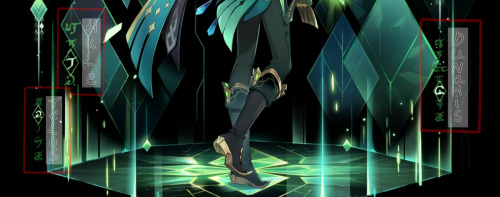

In art (Christian Theology in particular), the most common symbols associated with Prudence are the serpent, the owl (a more modern addition) and the mirror. This latter emblem also fits in accordance to the work of Haitham's namesake Ibn al-Haytham, the mathematician and polymath who wrote The Book of Optics. Mirrors are used historically to represent self-reflection and introspection, however they also have a deeper symbolism within the game's worldbuilding alongside reflections (hydromancy), vision, light and color... but that's an optics analysis for another time 0(-(


Justice
"Prudence was assigned to the rulers and to reason. Justice stands outside the class system and divisions of man, and rules the proper relationship among the three [cardinal virtues]."

The easiest one to associate, Cyno, of whom a large portion of his character revolves around the virtue of Justice and enacting judgement, also a nod to his connection to the god Hermanubis.
[Hermanubis (Ἑρμάνουβιϲ) is the combination of the Greek deity Hermes and the Egyptian Anubis, both of whom share psychopompos status (beings in charge of guiding the deceased to the afterlife). This god's origin can be traced back to Alexandria and Cynopolis, the origin of Cyno's name and is specific to the Roman Period. The name 'Hermanubis' was also borne by Alexandrian and Cynopolite individuals, the latter instance being found among a family of priests (usually a hereditary role back then). The french Egyptologist Jean-Claude Grenier analyses Anubis and his connection to Hermes and Mercury vs Hermes-Thoth at length in his book Anubis Alexandrin Et Romain (1977), and it's super interesting! He mentions Hermes' ancient portrayal as a canine, what that means and the links between Hermanubis and Hermes Trimegistus*.]
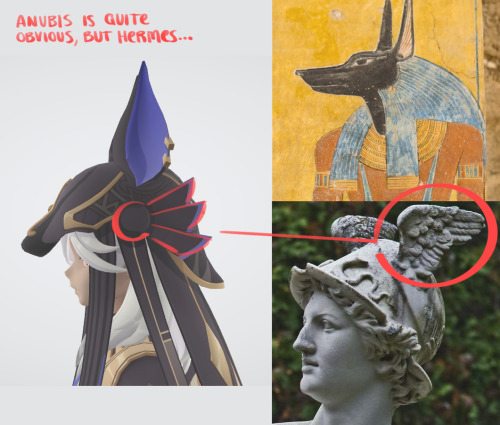

The concept of Justice Cyno upholds vs the material form of justice (as a system, with physical written laws) is an important distinction. It does not answer to any man-made jurisdiction or authority; Cyno exiled himself once the actions of the sages did not align with the notion of Justice he wants to preserve, and he obtained his vision whilst contemplating the legitimacy of one of the six cardinal sins of the Akademiya. There is an emphasis on his character stories on him treating criminals on equal grounds with the rest, waiting until they are safely escorted to the Akademiya before passing judgement. This is a significant point in virtue ethics. When talking about Justice as a virtue, it is more about the Planotic version of it, the concept as a whole:
"[Plato] used the Greek word "Dikaisyne" for justice which comes very near to the work 'morality' or 'righteousness', it properly includes within it the whole duty of man. It also covers the whole field of the individual's conduct in so far as it affects others. Plato contended that justice is the quality of soul [...]" - On Plato's concept of Justice
Plato's true justice involves harmony, non-interference, and the principle of limit. Each individual performs their own duties not for themselves but for the health of the whole. "Unlimited self-assertion is not a source of strength [...], unlimited desire and claims lead to conflicts."


Cyno describes himself as a vessel. Just like Anubis's role was that of an intermediary that brought souls to judgement, Cyno works as a mediator ["Judicator of Secrets", "Twilight Arbiter"] for a form of Justice that transcends him and exists beyond his own perception (perhaps related to his lineage or connection to King Deshret's priest Kasala,,,). He too must be judged in the same way.
"Only the law can judge you, and my role here is to bring you to face the scales." - Cyno's character story 2 "You may say that I have received much diving favor... [referring to his powers and electro vision] ...But I have no intention of letting this affect my code of justice. I will simply continue to do whatever is required to fulfill my duty." - 'About the Vision' voiceline
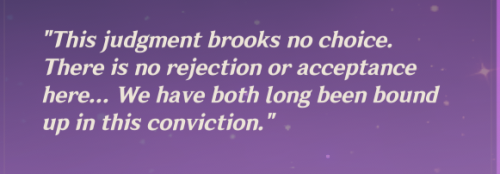


Justitia, the allegorical personification of Justice is also depicted by/ with scales as a common symbol alongside the blindfold or blindness. [We see some Eremite enemies wearing a blindfold, which may be connected to survivors who benefitted from Forbidden Knowledge as per The Lay of Al-Ahmar; "...they fell into eternal silence. It's said that they were made blind and mute as punishment..." Though vision, silence and 'blindness' seems to have an overall deeper symbolism in Genshin, going beyond just the concept of justice.] She is also often paired with Prudentia in Ancient Roman and Christian art, as they too work as mediators amongst each other; without prudence, justice cannot be practiced, and without justice, prudence may become self serving and lack moral grounding.

Fortitude
With the Mantichora constellation and the title of Flame-Mane, I think Dehya fits the descriptions for Fortitude (also referred to as Courage) all too well as well, usually depicted with or alongside a lion, armor, broken columns, swords or clubs.
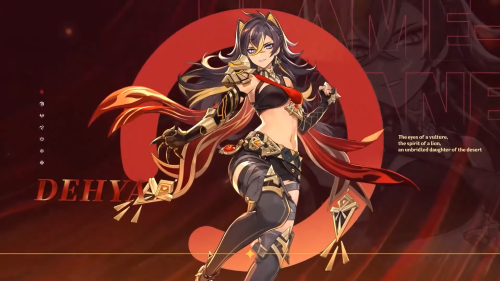
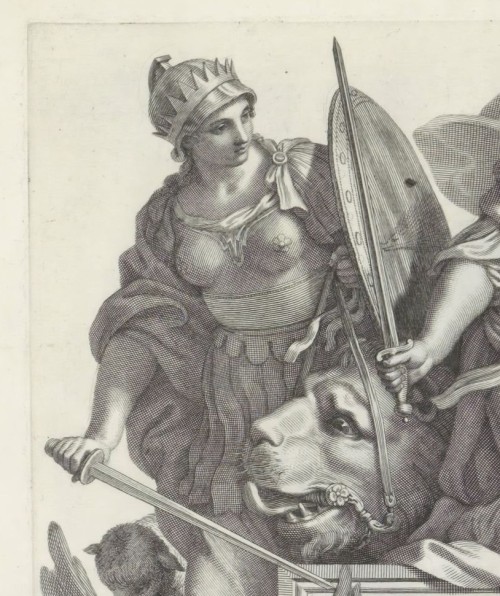
Fortitude does not exist in opposition to fear, but rather moderates it lest it compromises the person's good will. As previously discussed, the Aristotelian idea of moderation (stability between two extremes, fortitude striking the balance between apprehensiveness and excessive rashness) is fundamental when conceptualizing the virtues, and also a key part of Dehya's character!
"A highly regarded warrior among the mercenary circles, Dehya is brave without being impulsive, and strong without being arrogant. Life in the harsh desert environment has allowed Dehya to accumulate much combat wisdom through various battles, and she is by no means your typical insolent and ignorant martial artist." - Dehya's official HoyoLab introduction
During the Archon quest we are presented with two groups of people opposed to each other due to the Akademiya's manipulation. The "radical" people of the desert that wanted to believe in King Deshret's resuscitation vs the Dendro Archon's followers. The truth was that these groups of people were never fundamentally opposed, but were led to believe so by those in power. Dehya was able to see through all of this and maintain a clear mind in the face of conflict, which ultimately helped the group infiltrate Sumeru, rescue Nahida and properly confront those responsible for the institution's corruption. This composure and even-mindedness is what constitutes true fortitude; Plato describes it as "wise endurance", and "knowledge on the grounds of fear and hope."



They show us a simulated example of Dehya taking the virtue to one of its extremes; feigning recklessness to deceive the Eremites, acting like one of the King Deshret's followers. Though her actions would be justified and with Cyno pointing out that she could very well defeat them should she chose to fight, she understands the bigger picture and where her combat wisdom is really needed/ how to best utilize it. This is the knowledge the characters in Plato's Complete Work discuss.



Temperance
For example, when Mr. Zubayr is angry, everyone in the theater would be walking on eggshells. But Nilou would keep a warm smile, drawing wonderful patterns one after another in the air with her arms and fingers. "Imagine that we are in the rainforest that has just rained, and that you are following me as we walk onward, saying hello to every animal that passes by, waving, leaving everything else behind..." - Nilou's Character Story 4
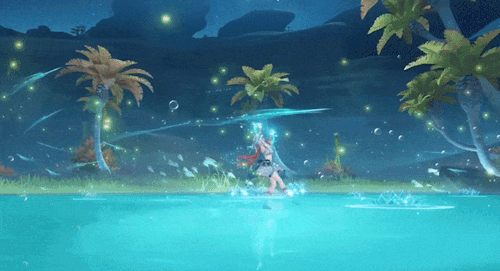
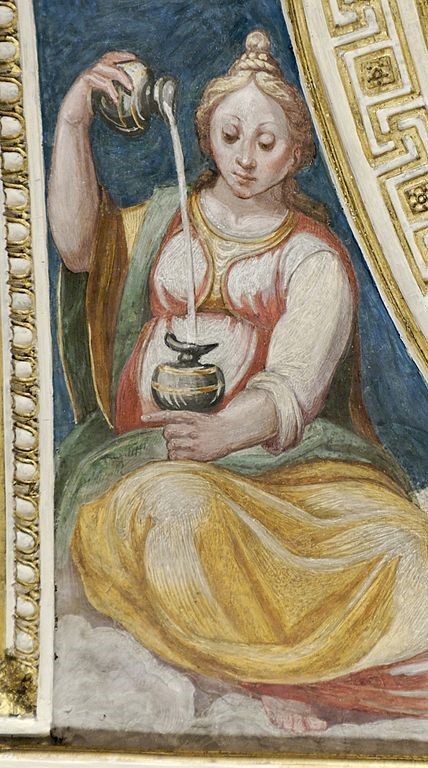
If the virtues can be identified as some kind of knowledge as per The Stoics and classical Philosophy propose, with Prudence being knowledge about what should be or not be done, Justice knowledge of the distribution and limits of proper value to each person, Courage of fear and hope, then Temperance is knowledge of what is to be chosen. Shaped by forgiveness and restraint, it is concerned with abstinence from non virtuous actions such as revenge, arrogance and indulgence through the cultivation of humility, modesty, calmness and self-control. It's root word in Greek, sōphrosunē (most often translated as "self-restraint") also derives from the word phronēsis (practical wisdom), putting emphasis in the action of the virtues to reveal true character. Being calm and composed is a defining trait of Nilou which fits accordingly with her being a performer! She has a couple of dialogues going over her methods for staying temperate in moments of unease.


Inayah: "I've already said that I'm not ready yet... Agh, what should I say..." Nilou: "Take it easy and relax. Deep breath, in and out. Once you've taken a long exhale, calmly tell everyone what you want to say." - Nilou's Story Quest
Art was also thought of alongside science to nurture temperance by means of their polishing. Darwin thought of it as a human ability cultivated through socializing, as it involves our relationship with others and can be measured through empathy; the Grand Bazar is referred to as a big family by Nilou, where everyone contributes to help each other. She also mediates conflicts between her parents [Character Story 1] and we see her do so on a larger scale during her Story Quest, debating the Akademiya to preserve the theatre, and showing forgiveness towards those who ignorantly opposed the arts.

[Aristotle viewed temperance in a much more restricted manner, narrowing it down to only the senses of touch and taste. Plato's notion of temperance, as well as in other religions and moreso in Eastern cultures it encompasses significantly more; forgiveness is a key matter in Christianity, in Hinduism literature we have the concept of Dama (from Sanskrit 'दम' or 'दमः', 'damah'). Temperance is also one of the key practices in Bhudhism in relation to the Eightfold Path.] The iconography for temperance is primarily a woman holding two vessels, transferring water from one to the other. It was also the virtue most often associated with the producing classes, the farmers and the craftsmen.
In the Major Arcana, Temperance is the fourteenth card whose meaning also aligns with the overview and symbols of the virtue in religion and philosophy. The female figure is usually standing with one foot on water, and it signifies the accommodation of all perspectives, taking the middle path and leveraging your skills and talents... (see Nilou's debate with the Akademiya) Nilou represents all of its attributes: chastity, humility, hospitality, forgiveness, decorum, calm deliberation. She creates harmony and cooperation, and doesn't over-indulge in any of the luxuries provided by her audience or friends at the Bazaar. · · ───────────────────── · ·
Extra juicy sources that are more general reading or couldn't be linked!: - The Cambridge Companion to Virtue Ethics (2013), by Daniel C. Russel - Nicomachean Ethics (Aristotle) - The Republic (Plato) - The Cardinal Virtues in the Middle Ages : a study in moral thought from the fourth to the fourteenth century (2011) by István Pieter Bejczy - The Fourfold Virtues of Augustine & Plato & Confucius

My boy, My Sonion, Neoptolemus as a proper Hades game fake screenshot
I was in a tiktok comment section like "l love Odysseus sm l wanna eat and gobble him up" and this mf comes out of nowhere like "B-b-b-b-but! But he's a narcissistic egoistic war criminal adulterer! " Like first of all; no he isn't read that book again, and second; IDC HOMIE he can commit manslaughter and say he was feeling a little silly and l will STILL defend and love him till the end, period. I love my crime lovin dilf ok? Give me a break 🙄
I’m thinking about Song Of Achilles again and like….I cannot think of the logic behind how Madeline Miller wrote Pyrrhus (Neoptolemus).
Like, he was a cruel asshole in the myths, so she got that part down.
But she added the wrinkle of him being raised by Thetis and did….nothing with it.
He quite literally exists solely to be a hate sink and to drag the plot out just a little longer.
Maybe he exists to give Thetis some form of redemption, by having her correct his big mistake.
But that raises even more questions because Thetis had been filling the role Pyrrhus had nearly the entire book. Pyrrhus may exists to show why its a good thing Thetis didn’t raise Achilles, but that is never the focus.
As far as the book is concerned, Pyrrhus is just a hate sink like Thetis (until the end) or Agamemnon to throw onscreen to get in the way of Achilles and Patroclus’ happy ending, and the inherent tragedy of him being a twisted Achilles or him being thirteen fucking years old by the time he’s onscreen is never touched upon.
Pyrrhus quite literally exists solely to be a replacement hate-sink for Thetis, and to provide some damn-near unearned last minute redemption for her.
Was Pyrrhus an ass in the original myths? Yes. Does that mean Madeline Miller could have wasted a potentially interesting character so she could throw in yet another one-note hate sink? Absolutely.
Random headcanon about Odysseus: we all know that he introduces himself as "Son of Laertes" but after Penelope, he def called himself "husband of Penelope" and after Telemachus was born, we all know he called himself "father of Telemachus". What can we say? He's a proud son/husband/dad.
